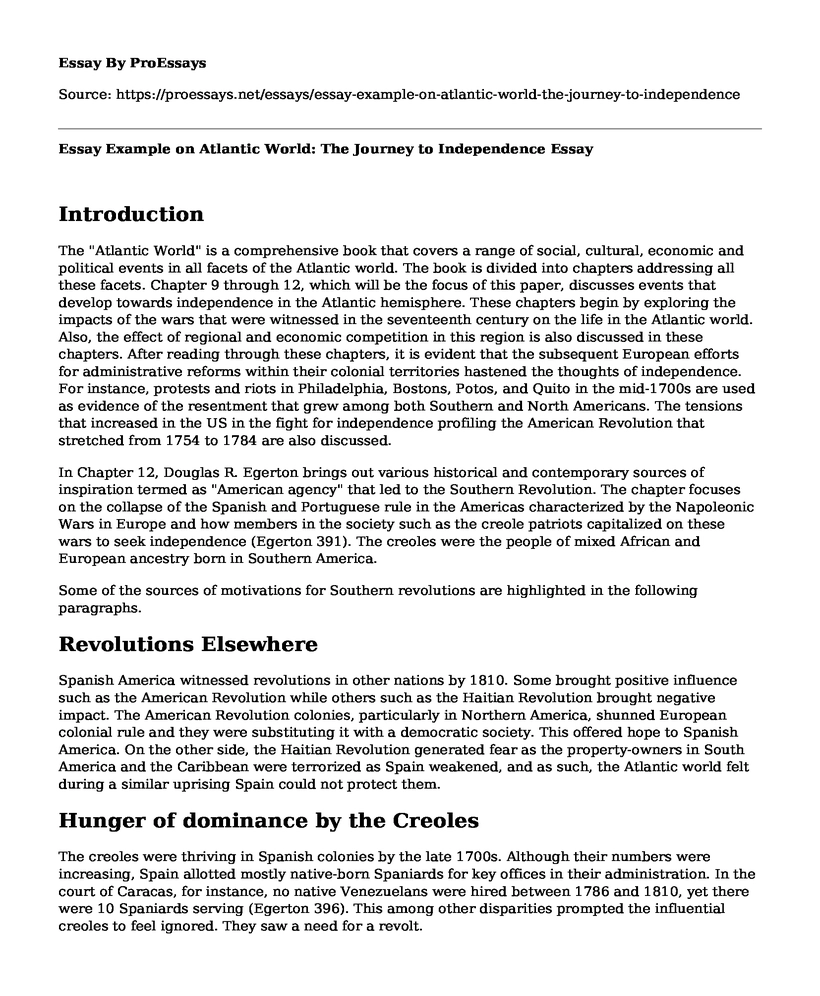Introduction
The "Atlantic World" is a comprehensive book that covers a range of social, cultural, economic and political events in all facets of the Atlantic world. The book is divided into chapters addressing all these facets. Chapter 9 through 12, which will be the focus of this paper, discusses events that develop towards independence in the Atlantic hemisphere. These chapters begin by exploring the impacts of the wars that were witnessed in the seventeenth century on the life in the Atlantic world. Also, the effect of regional and economic competition in this region is also discussed in these chapters. After reading through these chapters, it is evident that the subsequent European efforts for administrative reforms within their colonial territories hastened the thoughts of independence. For instance, protests and riots in Philadelphia, Bostons, Potos, and Quito in the mid-1700s are used as evidence of the resentment that grew among both Southern and North Americans. The tensions that increased in the US in the fight for independence profiling the American Revolution that stretched from 1754 to 1784 are also discussed.
In Chapter 12, Douglas R. Egerton brings out various historical and contemporary sources of inspiration termed as "American agency" that led to the Southern Revolution. The chapter focuses on the collapse of the Spanish and Portuguese rule in the Americas characterized by the Napoleonic Wars in Europe and how members in the society such as the creole patriots capitalized on these wars to seek independence (Egerton 391). The creoles were the people of mixed African and European ancestry born in Southern America.
Some of the sources of motivations for Southern revolutions are highlighted in the following paragraphs.
Revolutions Elsewhere
Spanish America witnessed revolutions in other nations by 1810. Some brought positive influence such as the American Revolution while others such as the Haitian Revolution brought negative impact. The American Revolution colonies, particularly in Northern America, shunned European colonial rule and they were substituting it with a democratic society. This offered hope to Spanish America. On the other side, the Haitian Revolution generated fear as the property-owners in South America and the Caribbean were terrorized as Spain weakened, and as such, the Atlantic world felt during a similar uprising Spain could not protect them.
Hunger of dominance by the Creoles
The creoles were thriving in Spanish colonies by the late 1700s. Although their numbers were increasing, Spain allotted mostly native-born Spaniards for key offices in their administration. In the court of Caracas, for instance, no native Venezuelans were hired between 1786 and 1810, yet there were 10 Spaniards serving (Egerton 396). This among other disparities prompted the influential creoles to feel ignored. They saw a need for a revolt.
Need for Free and Fair Trade
While the vast of Spanish New World Empire produced very many valuable products such as textiles, coffee, wine, cacao, mineral and more, colonies were only permitted to trade with Spain and at rates befitting the Spanish merchants. Some colonies resorted to trading with American merchants illegally, but the majority felt the need for free and fair prices in the market.
Americans, not Spaniards
There was a growing feeling among colonies that they were different from Spain by the end of the eighteenth century. This was evident in the cultural differences. As a result, locals did not prefer to be called Spaniards and preferred being called Americans.
Racism
The Atlantic populations were a mixture of Indians, Europeans, and blacks who came as slaves. The profoundly racist colonial society caused resentment among the ethnic minority.
Work Cited
Egerton, Douglas R. The Atlantic World: A History, 1400-1888. Wiley Blackwell, 2007, www.goodreads.com/book/show/1063326.The_Atlantic_World
Cite this page
Essay Example on Atlantic World: The Journey to Independence. (2023, Jan 03). Retrieved from https://proessays.net/essays/essay-example-on-atlantic-world-the-journey-to-independence
If you are the original author of this essay and no longer wish to have it published on the ProEssays website, please click below to request its removal:
- How Views of Ophelia's Madness in Hamlet Have Changed Over Time - Essay Sample
- Michael Radford's "1984" and George Orwell's "Nineteen Eighty-Four" Essay
- Essay Example on Carlos the Jackal: Notorious Terrorist and Revolutionary
- Essay Sample on First World War: Little Impact on Women in British Society
- 78 Years Later: Gentrix Badoux's Story of the Pearl Harbour Attack - Research Paper
- Nazis: From 1919 to Hitler's Leadership in 1921 - Essay Sample
- Riders to the Sea Movie Review Script Analysis







